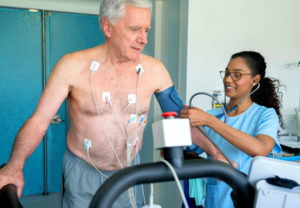 What is a Stress Echocardiogram Test?
What is a Stress Echocardiogram Test?
A Stress Echocardiogram, also known as Exercise Echocardiogram, is a test that allows Dr. Villa to evaluate your heart under stress conditions with the use of a treadmill and ultrasound. This test will produce images that are very helpful in detecting a variety of heart problems, especially coronary artery disease.
What will the images show?
High frequency sound waves produce images/pictures on a monitor that examine certain heart structures. These images will be recorded. The primary areas of interest are the chambers and the heart muscle wall. This technique does not directly visualize the coronary arteries, however, areas of the heart muscle that are supplied by diseased arteries may not pump as well as those areas supplied by healthy arteries. Dr. Villa will analyze the pictures and discuss the findings with your physician.
How is it done?
An Stress Echocardiogram test is divided into 3 parts.
Before the test begins, you will have several electrodes (small, sticky patches) placed on your chest and a baseline electrocardiogram (ECG) will be done. The Echocardiography Technologist will first perform an echocardiogram at rest.
To do this, a small device called a transducer is held against your chest with ultrasound gel while you lie on your left side with your left arm up. To improve the quality of the pictures, you may be asked to hold your breath in or out and not to speak at certain times.
The procedure is not painful, but the transducer may cause an uncomfortable feeling of pressure as it is positioned on your chest. The room will be darkened during the echocardiogram.
Next, you will be asked to walk on a treadmill. The average walking time is 6 to 10 minutes. Your blood pressure and ECG will be recorded several times throughout this test. The treadmill will start slowly and then gradually increase speed and incline. You will continue walking until you are either too tired to continue, you have reached your target heart rate or Dr. Villa or his/her designee has obtained adequate information. You will be asked to report any symptoms such as chest pain or shortness of breath. The test may be stopped if you experience these symptoms.
Immediately after you have finished walking on the treadmill, the final echocardiogram will be done. Again, you will lie on your left side while the transducer is placed on your chest to record pictures. When the procedure is complete, the gel and sticky patches will be removed. During the exercise portion of your test, Dr. Villa, Exercise Physiologist or Physician Assistant will be present. At the completion of the test, the Dr. Villa will evaluate all the pictures and information.
How do I prepare?
- Bring a list of your medications with you.
- Do not eat or drink anything for 2 hours prior to the test. Especially no CAFFEINE and no TOBACCO
- Dress in comfortable, loose fitting clothing and flat walking shoes. You will be wearing a hospital gown for the test.
Should I take my medicine on the day of the test?
Consult Dr. Villa about your medications.
How long does it take a Stress Echo Test?
Allow one and a half hours for this test.
How will I get the results?
Get a follow up appointment with Dr. Villa to review the results.
